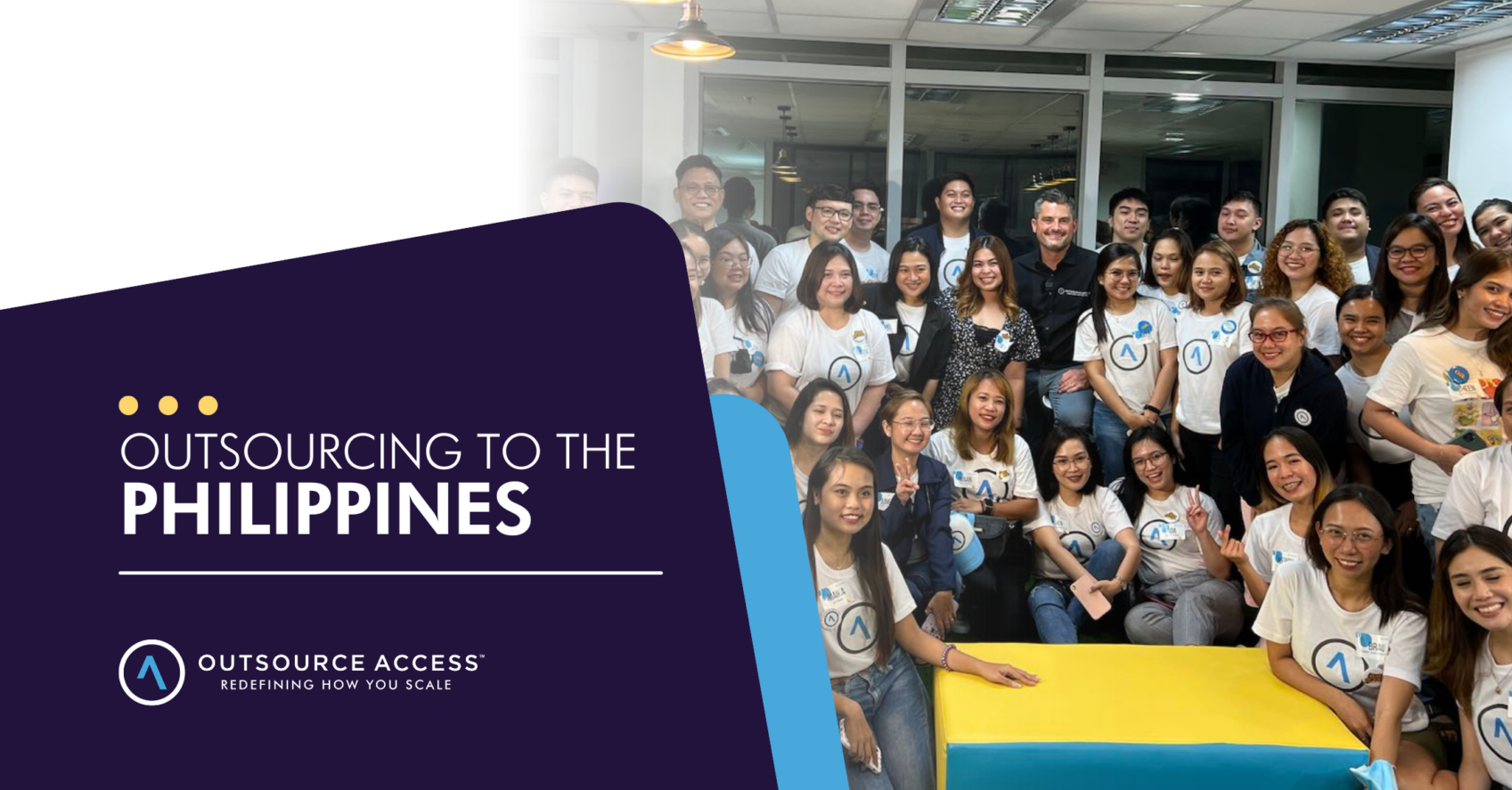Why Outsource in the Philippines?
With the recent surge in demand for outsourcing, there has been an emergence of thousands of outsourcing companies. The industry today is teeming with competition, as these outsourcing providers vie for one thing – your business.
So how do you know what company is the best for you? Well, for starters, it’s best to narrow down your search down to one country, the Philippines.
The Philippines is currently one of the go-to-destinations in Asia for its affordability and accessibility. But did you know this is why you should also outsource from the Philippines?
While countries like India, China, and Mexico have long been associated with outsourcing, the Philippines offers distinct advantages that make it an exceptional choice.
The BPO Capital of the World
High English Proficiency
Ranked 578 in the 2023 Global Ranking of Countries and Regions on English Proficiency, many Filipinos speak English fluently, a result of the country’s strong ties to the US.
Cultural Compatibility with Western Markets
Due to its history as a U.S. colony, Filipino workers are highly attuned to Western business ethics and values, making communication seamless.
Time Zone Advantage
Despite its GMT +8 timezone, the Philippines enables 24/7 support, with work completed overnight for faster turnaround and continuous operations in the U.S. and Europe.
Strong Government Support for Outsourcing Industry
The Philippine BPO industry is foreseen to contribute over 59 billion in revenue before 2028. As such, the PH government actively supports the industry, ensuring that outsourcing companies have the resources and stability it needs.
Cost-Effective Solutions
The Philippines has a low-cost of living, which allows it to offer highly competitive labor rates compared to other countries.
The Philippines vs Other BPO Markets
| FACTOR | Philippines | ||||||
|---|---|---|---|---|---|---|---|
| English Proficiency show details | High The Philippines ranks 20th out of 100 countries in English proficiency, with most Filipinos speaking fluent English | Moderate English is used in business settings but not as widely spoken as in the Philippines. Proficiency varies across regions and industries | Low English is not widely spoken, especially outside major cities. Vietnamese is the primary language used in business. | Moderate English is commonly used in business, especially in multinational corporations. Proficiency is higher in urban areas. | High Many Mexican professionals are bilingual, fluent in both Spanish and English. | Very High English is widely spoken and used in business settings. | High English is one of the official languages, widely used in business. |
| Cultural Affinity (based on factors of compatibility such as history, english proficiency, and shared values) show details | Strong The Philippines has a good understanding of Western culture due to its history with the US | Moderate India has a distinct cultural identity with some Western influences, especially in business practices. However, significant differences exist in social norms, traditions, and work styles. | Low Vietnam has a unique cultural identity with minimal Western influences. Differences in social norms, traditions, and work styles can create barriers to effective collaboration. | Moderate Malaysia has a diverse cultural landscape with Malay, Chinese, Indian, and Western influences. While some cultural similarities exist, differences in work styles and social norms require adaptation | Strong Proximity to the US fosters cultural similarities | Strong Western influences are prevalent in business practices. | Moderate Cultural differences exist but are manageable in business contexts. |
| Talent Pool (based on statistics) show details | Large and Diverse Over 700,000 graduates produced yearly, with a median age of 25.7 | Large India produces a significant number of graduates annually, especially in engineering and technology. However, the quality and employability of graduates vary. | Growing Vietnam's talent pool is expanding, with a focus on technical skills. However, the workforce is still developing compared to other countries. | Moderate Malaysia has a skilled workforce, particularly in industries like electronics and oil and gas. However, the talent pool is smaller compared to larger countries. | Skilled and Young Over 130,000 software engineers graduate annually, with a focus on IT and engineering. | Highly Skilled Renowned for its education system, producing top-tier talent. | Highly Skilled Strong emphasis on technology and engineering education. |
| Cost Savings (based on statistics) show details | High Labor costs are 80% lower compared to the US | High Labor costs in India are significantly lower than in developed countries. However, costs have been rising in recent years. | High Vietnam offers lower labor costs compared to other Southeast Asian countries. However, costs are higher than in the Philippines. | Moderate Malaysia has higher labor costs than other Southeast Asian countries but lower than developed nations. | Competitive Labor costs are 30% – 50% less than in the US. | Moderate Higher costs compared to other outsourcing destinations. | Moderate Competitive but higher than Southeast Asian countries. |
| Tax Incentives (based on laws and trade agreements) show details | Generous Offers 50% tax deductions, income tax holidays, and import duty exemptions | Moderate India offers tax incentives for specific industries and sectors, but the process can be complex and bureaucratic. | Moderate Vietnam has tax incentives for foreign investment, but the benefits vary depending on the industry and location. | Moderate Malaysia offers tax incentives for foreign investment, particularly in high-tech and knowledge-based industries. | Favorable Free trade agreements like USMCA facilitate business operations. | Attractive Offers tax incentives for foreign businesses and startups. | Strong Various tax incentives for foreign investment and R&D. |
| Data Privacy (based on country laws) show details | Robust The Data Privacy Act of 2012 ensures data security aligns with international standards | Moderate India has data protection laws, but enforcement and compliance can be inconsistent. | Moderate Vietnam has data privacy regulations, but the legal framework is still evolving. | Moderate Malaysia has data protection laws, but enforcement and compliance vary across industries. | Improving Mexican labor laws ensure compliance and foster positive working relationships. | Very Strong Strict data protection laws in place. | Very Strong Comprehensive data protection regulations. |
| 24/7 Operations (based on statistics) show details | Available Most BPO companies operate 24/7 due to time zone differences | Available India's large talent pool and advanced infrastructure enable 24/7 operations for outsourcing services. | Available Vietnam's BPO industry is capable of providing 24/7 support, but the availability may be more limited compared to larger countries. | Available Malaysia has the necessary infrastructure and talent to support 24/7 operations for outsourcing services. | Convenient Time Zones Similar time zones to the US facilitate real-time communication. | Available Strong infrastructure supports round-the-clock operations | Available Capable of 24/7 operations due to advanced technology. |
| Government Support (based on laws and government programs) show details | Strong The government fully supports the BPO industry as a major economic driver | Moderate The Indian government supports the IT and BPO sectors, but bureaucracy and red tape can sometimes hinder progress. | Moderate The Vietnamese government encourages foreign investment and has developed special economic zones to attract outsourcing companies. | Moderate The Malaysian government promotes the outsourcing industry, but support may be less extensive compared to other countries. | Supportive The government encourages outsourcing and has developed tech hubs. | Very Strong Active government initiatives to promote tech and outsourcing sectors. | Strong Government initiatives to support innovation and technology sectors. |
Ready to see how Outsource Access can help your business grow?
Click below to schedule a complimentary discovery call and unlock the potential of strategic outsourcing. Together, we’ll identify how to create a working synergy that enables you to achieve more while doing less.





